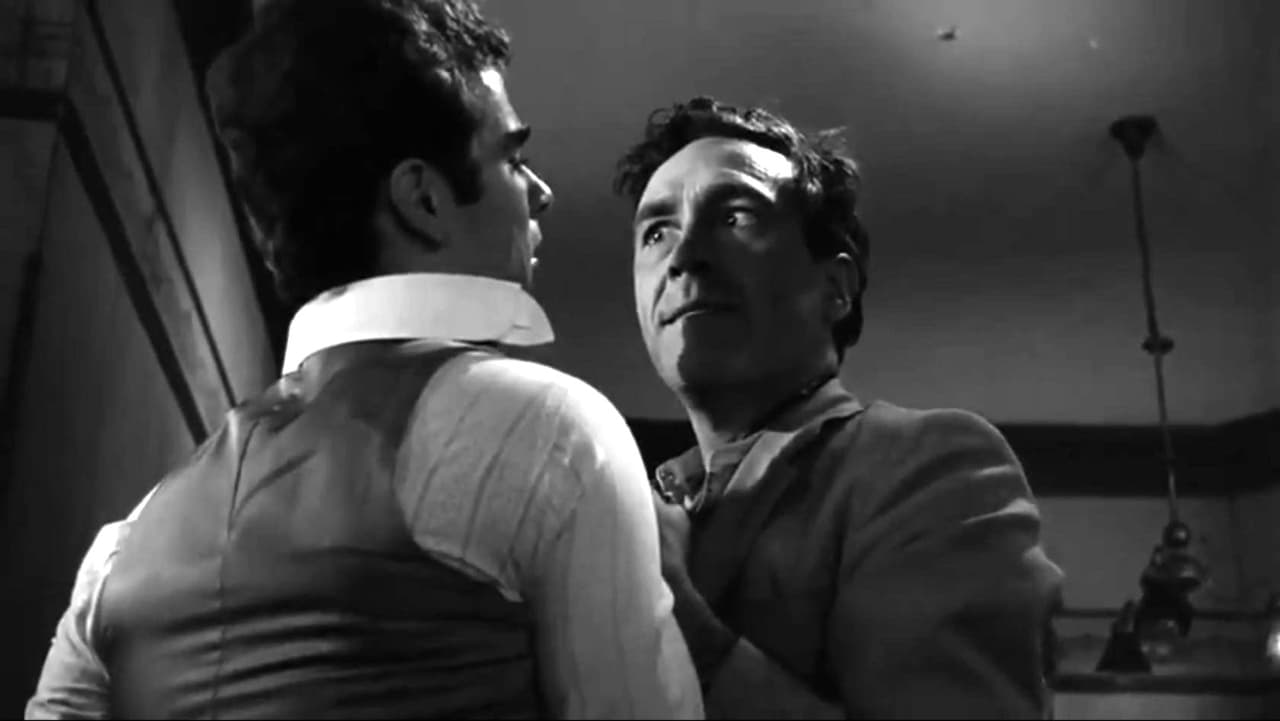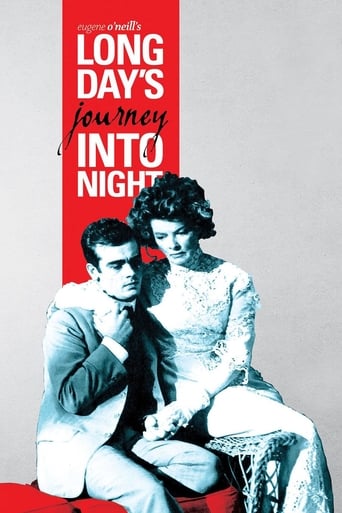

A lot of fun.
... View MoreIt isn't all that great, actually. Really cheesy and very predicable of how certain scenes are gonna turn play out. However, I guess that's the charm of it all, because I would consider this one of my guilty pleasures.
... View MoreOne of those movie experiences that is so good it makes you realize you've been grading everything else on a curve.
... View MoreOne of the best movies of the year! Incredible from the beginning to the end.
... View MoreIt doesn't help much that I watched this acclaimed film version of a Eugene O'Neill play right after suffering through a far more obnoxious filmed play (William Gibson's Two for the Seesaw, made the same year). Frankly, I just don't care for the theater, and these films underline pretty well the reasons why. I look at theater as a bunch of people (or two, in the case of Seesaw) on stage bellowing at each other for however many hours (three, in this film's case) while somehow refraining from falling victim to laryngitis. Long Day's Journey Into Night suffers from a lot of clichés: drug addiction, alcoholism, disappointment in lives, and, God help me, consumption (which I thought was just a disease made up by poets and playwrights, but it turns out it's just tuberculosis; "consumption" does sound cooler). Lumet tries to inject some filmmaking into the picture (as he did wonderfully with the equally stagebound 12 Angry Men a few years earlier), mostly in its beautiful final moments (the cinematography, I must admit, is fine throughout, though I really like '60s black and white), but mostly it's very static and is comprised of people talking steadily for the 180 minutes, give or take about three minutes of silence (the film's best moments). I'll give this a slight pass, however, for the acting, as stagebound as it may be. The acting to which I refer is not just Katharine Hepburn's, though hers was very good, too. Dean Stockwell, in my estimation, gives the film's best performance. Jason Robards and Ralph Richardson round out the cast. I thought they were both a bit overwrought, but not bad.
... View MoreHaving discovered O'Neills Mourning Becomes Electra a few months ago, I was interested in viewing this. Long Day just doesn't work in this era, because it's idea of drama is so limited; O'Neill shoe-horns dialogue/conversation into every opening. These characters have logorrhea. They talk everything out, then they break up into smaller groups and talk it out some more, then they move on to other groupings and talk it out some more, finally, as a finale, they talk it out some more. Words, words, words, words, words, words... After 30 minutes, you understand the psycho-dynamics and there's no real point in paying attention anymore. At one point this was controversial stuff, but any man on the street is now extremely familiar with the addictive personality and its resultant enabling, bullying & emotional manipulation. This family's problems are nor compelling. The movie is clearly going nowhere. In every scene they push each other buttons, and say awful things to each other; outbursts of no particular importance arrive about every 8 minutes.Mourning Becomes Electra has somewhere to go, and revelations that matter to the story. LDJiN hashes and rehashes the same points over and over. MBE is even more stagy and dated, but it has some actual shocks to deliver. Hepburn acting 'overwrought' is too familiar from her success. Her hop-head is hysterically inaccurate. She just comes downstairs cheerful and chatty after shooting up. Richardson is by far the worst here; a charter member of the British elocution club. He has an inexpressive stone face, with no perceptible emotional range.Strictly for people convinced that a string of outbursts is the height of drama. Who's Afraid of Virginia Woolf is it's spiritual sibling (and also a slog to watch!). But The Little Foxes is more acid, with superior structure.
... View MoreIn her long distinguished career, some of Katharine Hepburn's performances were mannered, while others were over-praised because of her near-mythic status. However, her Mary Tyrone in "Long Day's Journey into Night" was decidedly neither. Director Sidney Lumet crafted a meticulous filming of the Eugene O'Neill play without distracting from either the words or players with self conscious touches. But, the master director managed to keep his camera flawlessly positioned to capture the genius on display and maintain audience involvement. Boris Kaufman's low-key black-and-white cinematography was constrained by the largely one-set indoor stage, but managed to utilize light and shadow for timeless images of familial disintegration.The direction, cinematography, music, and editing all remain unobtrusive, however, so the incomparable work of a quartet of exceptional actors stays in focus. Dean Stockwell and Jason Robards play Jamie and Edmund Tyrone, the troubled sons of James Tyrone, an aging miserly actor. Like the two younger actors, Ralph Richardson has arguably done nothing that eclipses his work herein. O'Neill's masterwork is well served for posterity by the cast in this version. However, Katharine Hepburn raises a near-perfect record of a classic play to an even higher level. Hepburn's Mary Tyrone may not only be her finest screen work, but may rank among the greatest performances committed to celluloid. While day matures from morning to noon to night, the four Tyrones engage each other together and separately over issues that have simmered for a lifetime. Meanwhile, the day fades, and Hepburn's Mary descends from the light into the darkness as her grip on sanity ebbs with the sunlight and she retreats into the shadows of the Tyrones' dimly lit parlor.The film is nearly three hours long, but the words are rich, and the players obviously relish the lines. Patient viewers who seek familiarity with O'Neill's play could not find a better venue. Fans of any one of the four major cast members will find the film essential viewing, and those who want to see Katharine Hepburn at her apogee need look no further.
... View MoreEugene O'Neils "Long Days Journey Into Night" can be seen as the blueprint from which later family character dramas were drawn. Not the first and arguably not the best, it nonetheless is a remarkable play in the way it dramatizes the emotions that tear a family apart and keep them together.After a clunky opening meant to draw attention away from the play's inherent staginess and a too forced and unrealistic scene between Jason Robards (as Jamie) and Ralph Richardson (as James Tyrone), "Long Days Journey Into Night" soon turns into something stronger and it is all due to Katherine Hepburn.Whatever preconceptions one has of Hepburn's abilities, her sometimes high toned, even snobby attitudes, occasional lapses in credibility (see "Dragon Seed" or "Song of Love" or "Sea of Grass), her knockout performance here is staggering. This is the perhaps the last time Hepburn would truly act in one of her films. Four years would pass before she'd be seen in a movie again and it would be in the reprehensible "Guess Who's Coming to Dinner". After that movie and the following year's performance in "The Lion in Winter", Hepburn passed from actress into legendary woman status that effectively wiped away her ability to really perform.In "Long Days Journey " Hepburn is amazing. The role of Mary is one that could easily pull down an entire production if not acted right. Its scenery chewing potential is great and Hepburn walks a high wire act all the way through. You hold your breath waiting for her performance to falter and strike a false note, to see the acting going on. There's no sentimentality or vanity about the performance: it's harsh, upsetting and terrifying. And exhilarating. Performances like these are what make people want to act in the first place. It is truly thrilling to see a performance of this energy and concentration. A consummate pro giving it their all in top form. The only performance that I can think of that equals it is Vivien Leigh's in "A Streetcar Named Desire".As for the movie itself, it's really a filmed play slightly opened up. The acting by the rest of cast is excellent from Richardson to Robards to Stockwell down to Jeanne Barr as the cook. They all seem to willingly recede when Hepburn is on.
... View More